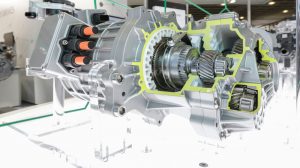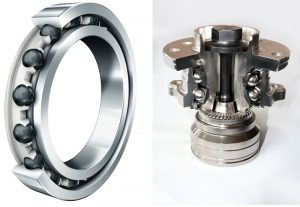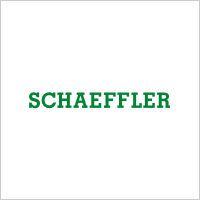India is a high-growth market and a key focus area for SCHAEFFLER
A global automotive and industrial supplier, Schaeffler, with four plants and 19 sales offices has significant presence in India. The company’s three major product brands – FAG, INA and LUK – are well represented in India. Schaeffler in India has earned global qualifications both in terms of quality and productivity and the group is now actively looking at Indian operations as an important manufacturing hub in this region. The company recently appointed Harsha Kadam as Industrial President. Excerpts from an interview with Huned Contractor
Q. In your new role as Industrial President, what will be your scope of responsibilities and activities?
I will be looking after Schaeffler’s industry business in India and will be part of the company’s leadership for this market. It is exciting times at Schaeffler, what with the consolidation of the three brand entities into one. This I believe is a ‘force multiplier’ in the market. We will be able to better leverage the strengths and synergies of the three strong brands. On this new platform, I and my team will strive to build a strong Schaeffler brand in India.
Q. Could you elaborate about the bearing manufacturing facilities of the company in terms of infrastructure and capacities?
Schaeffler’s three major product brands – FAG, INA and LUK – are well-represented in India. The manufacturing plant at Vadodara produces a vast range of ball bearings, cylindrical roller bearings, spherical roller bearing and wheel bearings and sold under the brand name of FAG. The second plant in Vadodara at Savli produces next generation deep groove ball bearings and large size roller bearings also sold under the name of FAG. Schaeffler’s third plant at Talegaon near Pune manufactures needle roller bearings, steel cages, pulleys, cam rollers and a wide range of precision components for valve train, drive systems in engine and transmissions under the INA brand. The fourth manufacturing location is based out of Hosur that manufactures clutch systems, hydraulic release systems and dual mass flywheels for passenger cars, light commercial vehicles, heavy commercial vehicles and tractors and the products are sold under the brand of LUK.
In addition to this, Schaeffler also has dedicated engineering and research and development support based in India to augment the product teams. The company has invested in captive testing capabilities for validating the wide product portfolio under the three brands. To shorten the sample submission lead time, we also have a prototype shop with state-of-the-art machines to meet the local needs of our customers. All in all, we are well-equipped with capabilities to add value to our customers’ needs at a product or application level. Testimony to this is the number of projects at a system level that the team is working on to bring higher value offering to our esteemed customers.

Q. What is the India market size for bearings and what is the market share of Schaeffler India?
India’s bearings market is expected to cross over USD 4 billion benchmark by 2019 (Ken Research) with future growth expected to be led by growth in industrial production as well as demand from the automobile sector. The government’s ‘Make in India’ initiative, tax and research and development incentives amongst others will attract investments in the sector. On the industrial side, railways, wind energy, two-wheelers, and tractors look very attractive and will remain high-focus sectors for the country. We have a strong presence in those, so we will definitely benefit from the growth in these evolving sectors. Keeping this in mind, we are increasing our overall capacities in certain areas. We are enhancing capacity at our Savli plant on the large-sized bearing and also increasing the localization rate there. The bearings from Savli go into wind applications, and into raw materials space like steel mills, cement plants, mining and others.
Q. How does the synergy of the combination of FAG, INA and LUK benefit Schaeffler India’s growth?
India is a high-growth market and a key focus area for Schaeffler. Keeping that in mind, we have recently announced merger of Schaeffler’s three product brands under a single ‘Schaeffler India’ identity. The key objective of this merger is to combine the strengths and competencies of all three Schaeffler entities in India and establish one strong listed Schaeffler entity in India in line with Schaeffler Group’s strategy ‘Mobility for Tomorrow’. Over the past couple of years, we have successfully grown from a components manufacturer into a complete components and integrated systems supplier by leveraging the collective strengths across our range of products and our strong product brands LuK, INA and FAG. We are a leading supplier of a wide range of ball and roller bearings, needle roller bearings, engine, transmission and chassis components and a wide range of clutches. Combining our diverse product presence, we are well-positioned across the high growth automotive and industrial segments that enable us to offer complete systems and solutions for our customers.

Q. What kind of research and development is the company engaged in as regards bearings?
We are integrated with our global technology centres. In Maneja we have the Schaeffler Technology Centre which primarily assesses all our industrial customers with bearing applications. Product development, selection, application in the right environment, consultancy and solutions are provided here. On the automotive side, Pune is the main centre of development, while in Hosur it is clutch and transmissions. In a year we hope to merge the three R&D centres into one entity. They work very closely with our HQ and other development centres around the world, depending upon the area of competence and expertise. In India we are primarily focusing on two areas that we are developing as the centre of expertise for global applications – two-wheelers up to 250 cc motorcycles and agricultural vehicles like tractors and other equipment.

For us, the most important thing is to be close to the customer, where the customer’s needs are. This year, in India, about 20 million two-wheelers will be produced. We also have strong, local OEMs who design and develop their own two-wheelers here. Honda, Yamaha, Suzuki are all building up capabilities in India; not just manufacturing but product development capability – we work very closely with them. Coming to tractors, India is the largest tractor manufacturer in the world with 7,00,000 tractors produced with strong local OEMs like Mahindra, Swaraj, TAFE, etc. They all design and produce their own tractors. We work closely with them as also the international companies like CNH, JCB and others.

Q. Has Schaeffler India adopted Industry 4.0 standards? If so, how has it helped?
As a global automotive and industrial supplier, Schaeffler is digitally transforming its entire business, which involves the integration of its mechatronics components, systems and machines into the rapidly expanding world of the ‘Internet of Things’. These days, the value of a car or machine is determined less and less by hardware and software alone. Digital services, based on networked operating data, complement the classic business models in the automotive and mechanical engineering sectors. As a supplier to these industries, Schaeffler is not only reacting to this trend, but is also thinking ahead and playing an active role in shaping the future. The ‘Schaeffler Smart Ecosystem 4.0’ offers a universal, flexible and open infrastructure from sensorized components. Connecting the Schaeffler domain know-how is the key to transform data into information and information into real action tasks.
The customer value chain is optimized in terms of availability, reliability and process quality. In industrial automation, it is essential for extremely divergent systems from various manufacturers to interact reliably and efficiently. The users, operating globally, expect to be able to source their accustomed products and systems everywhere in the world. We are closely working with IBM at their R&D centres on IoT, Industry 4.0 and big data digitalization. IBM’s cognitive technologies will support Schaeffler’s Industry 4.0 strategy for tooling machines helping to improve overall equipment efficiency (OEE).
This includes the optimization of production processes, real time analysis of data and context-driven maintenance, networking and optimization of multiple machines within a production line. The objective is to continuously optimize production and supply chain. The focus is on internal optimization to increase efficiency and to leverage this for the creation of new service offerings for customers and partners. We are also working with our HQ on evolving digitalization needs for e-mobility applicable to the automotive industry.
Q. What are the company’s expansion and investment plans for 2018?
In the last three years, Schaeffler has invested about Rs 145 crore each year in India. Over the next 3-5 years we will continue to invest in expanding our plant capacities, our product portfolio and engineering capabilities in the country. We are going to invest in our distribution network and all the logistics areas which will provide us substantial benefits in the long run. We have also announced expansion of our operations at INA Bearings in Talegaon. The expansion will include a new manufacturing facility and a new R&D facility within the existing premises. We are investing Rs 200 crore for this expansion. The new production facility will be operational by the end of 2018 and will manufacture engine and transmission components, serving the domestic and exports markets. The R&D facility that will be operational by mid-2018 will focus on enhancing product development and engineering capabilities driving innovation for customers. The Pune plant, currently running at full capacity, employs 700 people and with the new facility it is expected to generate additional employment in the future as our operations grow. We particularly see big opportunities in the country in areas of two-wheelers, agricultural tractors, wind energy, railways, steel and other infrastructure-related sectors. Going forward, we are doubling our investment into the India market from 2018.
Q. How does the company tackle the challenge of a huge counterfeit and grey market in bearings?
In 2004, Schaeffler set up a central department for fighting product and brand piracy. The Schaeffler Group employs a zero tolerance policy towards all cases of product and brand piracy with its primary aim being to protect its customers’ interests. To protect buyers and end clients procuring INA and FAG products from distributors, Schaeffler has assessed and certified sales partners worldwide. All authorised distributors are listed on the Schaeffler website and can be checked by entering the certificate number. Promoting counterfeit and non-conforming parts causes serious damage, reduces vehicle life and increases the likelihood of fatal road accidents.
Q. Does Schaeffler India export bearings? If so, could you provide details and numbers?
Of our total business from India, exports contribute almost 16% to our sales. Wheel modules and transmission bearings from our Maneja and Savli plants are exported to Europe, US and Asia. We also export engine, transmission and chassis components, including needle roller bearings from our Talegaon plant in Pune.




